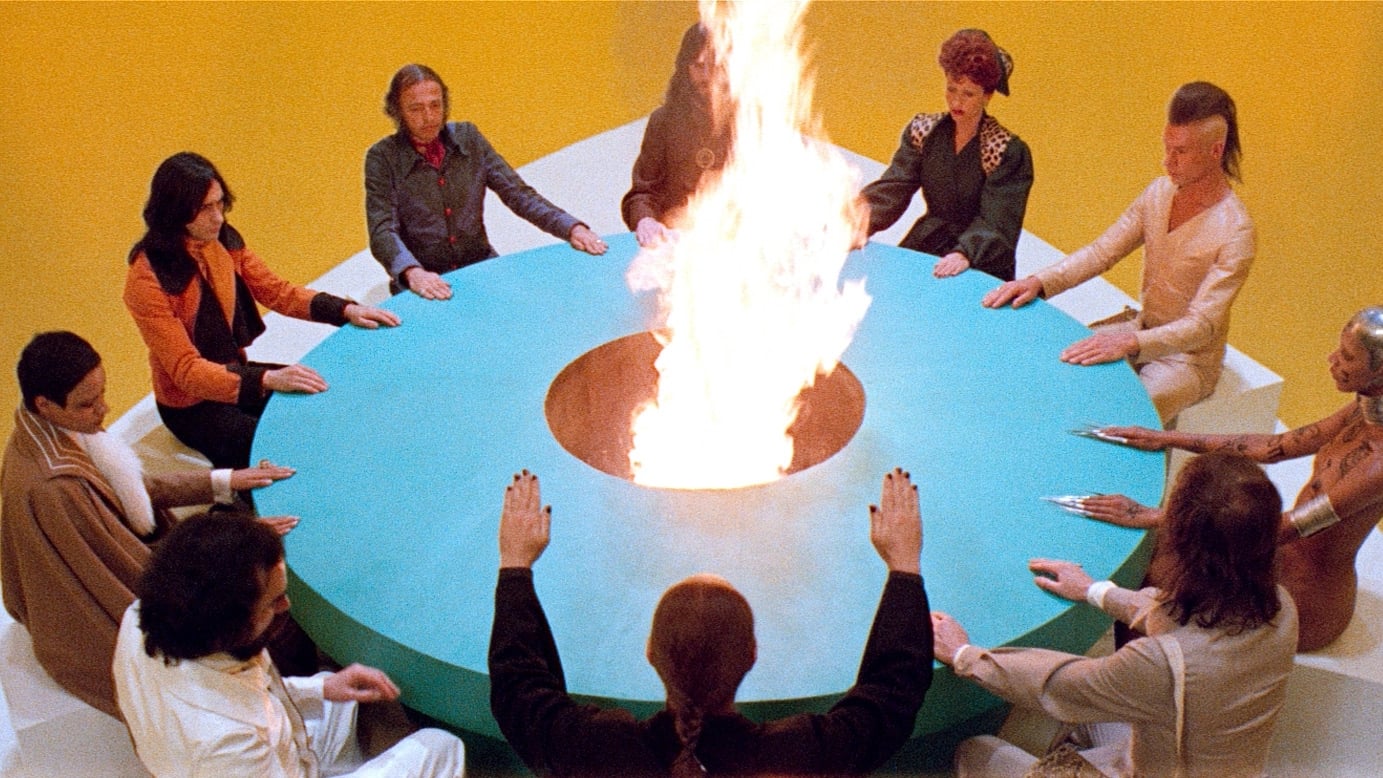Ever dissected your fave flick at 3 AM, convinced you could write the next Oscar winner? This ain’t just armchair analysis, folks! Film scholarship is a treasure trove of knowledge, research power, and career-launching opportunities – and it’s more accessible than you think. We’re talking full scholarships, global film school secrets, and insider tips to snag funding for your cinematic dreams. ✈️ So, cinephiles, grab your popcorn (and your textbooks!), because we’re unlocking the vault of film academia and unleashing your inner film scholar! ✨
Click inside to:
- Decode scholarship mysteries: From Hollywood to London, discover funding secrets no film school tells you.
- Master the grant game: Craft proposals that win judges over like your favorite rom-com hero.
- Unleash your inner Indiana Jones: Explore hidden treasures in film archives and libraries around the world. ️️
- Get schooled by the best: Learn from top film scholars and industry pros, and no expensive tuition is required!
So, what are you waiting for? The future of cinema awaits – your name on the credits, the applause of the critics, and a career forged in your passion for film. Let’s dive in! ✨
Cracking the Code: Your Blueprint to Navigate the Film Scholarship Maze
Let’s be honest, film analysis pulsates through my veins. In my 20 years of navigating the exhilarating labyrinth of the film industry, I’ve witnessed the transformative power of scholarship firsthand. So, aspiring cinematic sleuths, gather ’round! Today, we’re cracking the code to unlock the treasure trove of film scholarship and research organizations.
I. Unveiling the Scholarly Spotlight: Why it Matters.
Remember poring over those midnight-oil-fueled essays dissecting your favorite flicks? It wasn’t just academic torture (okay, maybe sometimes). You were delving into the intricate tapestry of the film, unearthing its social commentary, historical echoes, and artistic audacity. That, my friends, is the essence of film scholarship.
Film isn’t just popcorn entertainment; it’s a cultural kaleidoscope reflecting our world back at us, warts and all. Scholarship equips you with the analytical tools to decipher this visual language, and to understand the subtle nuances that make a film sing. But beyond personal enrichment, film scholarship has a real-world impact. It informs policy decisions, shapes film preservation efforts and even influences future cinematic trends.
Think of it this way: you’re not just analyzing a film, you’re contributing to a vibrant intellectual dialogue that shapes our understanding of the world and ourselves. Pretty heady stuff, right?
II. Mapping the Scholarship Minefield: Diverse Treasures Await.
Now, let’s delve into the practicalities. Navigating the landscape of film scholarship and research organizations can feel like traversing a dense jungle. Fear not, intrepid explorers! Here’s a handy map to guide your way:
Governmental Guardians:
- National Endowment for the Arts (NEA): This US institution dispenses grants for everything from film production to scholarly research, ensuring diverse voices get heard.
- British Film Institute (BFI): Across the pond, the BFI champions UK cinema through research funding, film preservation efforts, and educational programs.
Academic El Dorado:
- UCLA Film & Television Archive: This treasure trove houses a staggering collection of film materials, offering scholars a one-stop shop for research gold.
- University of Southern California’s School of Cinematic Arts: Boasting renowned faculty and cutting-edge research facilities, USC stands as a beacon for aspiring film scholars.
Non-Profit Allies:
- Academy Film Scholars Program: This prestigious program mentors emerging scholars, providing a platform for groundbreaking research and career-defining connections.
- Sundance Institute: From fellowships to workshops, Sundance fosters independent storytelling and supports scholars who delve into the world of cinema beyond the mainstream.

Industry Insiders:
- Directors Guild of America: Guilds like the DGA offer grants and research opportunities specifically geared towards their members, fostering a deeper understanding of the filmmaking process.
- Writers Guild of America: The WGA supports scriptwriters’ artistic and scholarly pursuits, ensuring the voices behind the narrative get their due.
Remember, this is just a glimpse into the vast network of resources available. In the next leg of our journey, we’ll crack open the treasure chest of funding opportunities, equipping you with the tools to turn your scholarly dreams into reality. Stay tuned, film fanatics, the adventure’s just begun!
Unlocking the Funding Vault: Your Guide to Securing the Gold.
Now that you’ve mapped the landscape of film scholarship organizations, let’s dive into the nitty-gritty of funding. After all, even the most groundbreaking research needs a financial boost to take flight.
Here’s the inside scoop on different types of funding opportunities and how to navigate them like a pro:
Grants Galore:
- Research Grants: These grants support specific research projects, typically focusing on a particular topic or theme. Think of them as the fuel for your scholarly explorations.
- Graduate Study Scholarships: If you’re pursuing a graduate degree in film studies, these scholarships can help alleviate the financial burden and let you focus on your academic pursuits.
- Postdoctoral Fellowships: For those seasoned scholars seeking to further their research, postdoctoral fellowships provide the time, resources, and mentorship to produce groundbreaking work.
Pro Tips for Treasure Hunters:
- Know Your Worth: Don’t underestimate the value of your research. Clearly articulate the significance and potential impact of your project to potential funders.
- Do Your Homework: Research potential funders thoroughly and tailor your proposals to their specific interests and priorities. Showing you’ve done your due diligence will impress.
- Network Like a Pro: Connect with other film scholars, attend conferences, and build relationships with key figures in the field. These connections can lead to invaluable insights and funding opportunities.
- Meet the Deadlines: Stay organized and adhere to submission deadlines religiously. Trust me, nothing derails a promising project faster than a missed deadline.
- Persistence Pays Off: Don’t be discouraged by rejections. Securing funding is often a competitive process. Embrace feedback, refine your proposals, and keep knocking on those doors.
Remember, securing funding is a marathon, not a sprint. It takes patience, perseverance, and a dash of strategic planning. But with the right approach and a bit of luck, you’ll soon be celebrating those funding victories and embarking on your scholarly quest.
Your Research Arsenal: Essential Tools for the Journey.
Every seasoned explorer knows the importance of packing the right tools. In the realm of film scholarship, your arsenal of resources extends far beyond dusty books and flickering screens. Let’s unveil some of the most valuable tools at your disposal:
Online Gems:
- Grants.gov: This official US government website lists a plethora of funding opportunities across various disciplines, including film studies. A must-bookmark for any grant seeker.
- Film Studies Journals: Immerse yourself in the latest scholarly conversations and debates by browsing through leading film studies journals like Cinema Journal, Screen, and The Journal of Film and Video.
- Academic Conferences: These gatherings are not only prime networking grounds but also offer a chance to present your research, receive feedback, and stay abreast of emerging trends.
- Film Archives and Libraries: Step into a cinematic time capsule by visiting film archives and libraries like the Library of Congress, the British Film Institute, and the UCLA Film & Television Archive. These institutions hold rare and precious film materials that can spark groundbreaking research.

Digital Wonders:
- Digital Humanities Tools: Embrace the power of technology to analyze films in innovative ways. Tools like Scalar and Voyant Tools allow you to visualize data, create interactive timelines, and uncover hidden patterns within films.
- Online Research Communities: Connect with fellow film scholars from around the globe through online forums and discussion groups. Share ideas, seek advice, and collaborate on projects, transcending geographical boundaries.
Remember, knowledge is power in any field, and film scholarship is no exception. By strategically utilizing these resources, you’ll not only elevate your research but also connect with a vibrant community of film enthusiasts, scholars, and industry professionals.
The Future Reel: Where Film Scholarship is Headed.
As a seasoned film industry veteran, I’ve witnessed the evolution of film scholarship firsthand. And let me tell you, the future of this field is as vibrant and dynamic as the silver screen itself. Here’s a glimpse into some of the exciting trends shaping the future of film scholarship:
Digital Humanities Take Center Stage:
- Technology is transforming film analysis, opening up new avenues for exploration. Expect to see more scholars embracing digital tools to uncover hidden layers of meaning within films, creating interactive experiences, and collaborating across disciplines.
- Global Cinema in the Spotlight:
- The field is moving beyond its traditional focus on Hollywood and European cinema, embracing a more inclusive and diverse perspective. Scholars are increasingly delving into the rich cinematic traditions of Asia, Africa, Latin America, and beyond, challenging Eurocentric narratives and expanding our understanding of film as a global art form.
- Ethical Considerations in the Frame:
- As film scholarship tackles sensitive topics like representation, consent, and intellectual property, ethical considerations are becoming paramount. Scholars are grappling with questions of power, ownership, and the potential impact of their research on marginalized communities.
- Immersive Storytelling:
- Virtual reality and augmented reality are poised to revolutionize film scholarship, offering immersive experiences that transport viewers into the worlds of film. Imagine analyzing a film from within its very landscape, interacting with characters, and exploring alternative narratives.
Remember, the future of film scholarship is not just about analyzing films; it’s about shaping the future of cinema itself. By embracing these trends, scholars are not only expanding our understanding of film history and theory but also actively contributing to the evolution of filmmaking, storytelling, and cultural discourse.
Beyond the Credits: Your Role in the Cinematic Tapestry.
We’ve reached the final act, but the story of film scholarship is far from over. In fact, it’s just beginning to unfold, and you, my fellow cinephiles, have a crucial role to play.
Here’s a parting shot of inspiration to fuel your scholarly pursuits:
- Embrace Your Passion: Film scholarship isn’t just an academic pursuit; it’s a love letter to the art form that moves us, challenges us, and reflects our world. Never lose sight of the passion that ignited your journey.
- Challenge Conventions: Don’t be afraid to question established norms and explore uncharted territories. The most groundbreaking scholarship often emerges from a willingness to challenge the status quo.
- Collaborate and Connect: Film scholarship thrives on diverse perspectives and interdisciplinary collaborations. Seek out partnerships with scholars from different fields, filmmakers, archivists, and community organizations.
- Advocate for Film Preservation: The preservation of film heritage is essential for the future of scholarship. Support organizations dedicated to preserving film archives and advocate for policies that protect our cinematic legacy.
- Share Your Knowledge: Whether through publications, conferences, or public engagement, share your research findings with the wider world. Help bridge the gap between academia and the public, fostering a deeper appreciation of film’s cultural significance.

Remember, every scholarly endeavor, every insightful analysis, every passionate debate contributes to the vibrant tapestry of film scholarship. Your voice matters. Your perspective matters. Your contributions matter.
What is film scholarship?
Film scholarship isn’t just about dissecting your favorite flicks at midnight (though that’s part of the fun!). It’s about using analytical tools to understand a film’s deeper meaning, its reflections on society, and its artistic impact.
Think of it as cracking the code of cinema, uncovering the layers that make a film sing. Film scholars also contribute to research, shaping film preservation efforts, influencing policy decisions, and even predicting future trends in the industry. It’s about turning your passion into knowledge that shapes the world.
2. How can I get a full scholarship?
Landing a full scholarship is like nabbing the Best Picture award – exciting, but it takes some dedicated campaigning. Here’s the playbook:
- Showcase your brilliance: Apply to scholarships that match your research interests and career goals. Ace your grades, build a strong portfolio (think scripts, short films, film analyses), and network with mentors and professors.
- Become a grant ninja: Research every opportunity like a detective! Utilize resources like Grants.gov, film study journals, and university websites. Craft compelling proposals that highlight your research’s significance and potential impact.
- Network like a pro: Connect with fellow film enthusiasts, attend conferences, and build relationships with key figures in the field. These connections can lead to invaluable insights and scholarships you might not find on your own.
- Persistence pays off: Don’t be disheartened by rejections. Apply, refine your proposals, and keep knocking on doors. Remember, even the most acclaimed directors faced countless “noes” before their big break.
3. Which country is best for filmmaking?
There’s no “one size fits all” answer, as each country boasts its own cinematic landscapes and opportunities. Hollywood in the US might be the industry giant, but emerging economies like China and India are rapidly growing.
Europe offers rich film cultures and established production infrastructures. Ultimately, the best country for you depends on your filmmaking style, language skills, and career aspirations. Research, network, and visit film festivals or study abroad programs to explore your options!
4. Does the London Film School offer scholarships?
Absolutely! London Film School (LFS) boasts several scholarship programs for both UK and international students, including merit-based awards, regional scholarships, and need-based options. Head to their website to explore specific options and deadlines. Remember, competition is fierce, so prepare your applications well in advance.
5. How much does the London Film Academy cost?
Costs at the London Film Academy (LFA) vary depending on the program you choose. Short courses can range from £2,000 to £5,000, while longer diploma programs can cost upwards of £20,000. They also offer scholarships and bursaries, so definitely explore their financial aid options to see if you qualify.
6. Does the London Film School accept international students?
Yes! LFS embraces diversity and welcomes international students. Their application process caters to international applicants, and they offer dedicated visa support services. So, if you’re a film enthusiast from across the globe, London Film School might be your stepping stone to international filmmaking stardom.
7. What does a film student do?
Film students wear many hats – from analyzing narratives to mastering cameras, editing software, and even acting. Expect courses in film history, theory, screenwriting, directing, producing, cinematography, sound design, and more.
You’ll also immerse yourself in practical projects, collaborating with peers on short films, documentaries, and other creative endeavors. It’s a demanding but exhilarating journey that challenges you intellectually and artistically.

8. How to get a scholarship to NYU Film School?
NYU Tisch School of the Arts is a dream destination for many filmmakers. To snag a scholarship, follow the tips from question 2: shine academically, showcase your talent, network strategically, and craft compelling scholarship applications.
NYU offers several merit-based and need-based scholarships, so research their website and contact their financial aid office for detailed information. Remember, competition is fierce, so prepare yourself well and stand out from the crowd.
9. How to get a scholarship to the American Film Institute?
The American Film Institute (AFI) provides several scholarship opportunities for its prestigious Conservatory program. Their merit-based scholarships consider artistic excellence, academic achievement, and financial need. Similar to NYU, research their website thoroughly and prepare a strong application that showcases your talent and potential. Don’t forget to network with AFI alumni and attend events to gain valuable insights into the application process.
10. What do film scholars do?
Film scholars wear multiple academic hats too! They conduct research on various aspects of cinema, analyzing history, theory, aesthetics, technology, and the social impact of film. They write books and articles, teach courses at universities, curate film festivals, and even advise policymakers on cultural and artistic issues related to film. Their work helps not only understand film as an art form but also shapes its future direction and influences how we think about and interact with movies.
11. What is the Harvard scholarship?
Harvard University doesn’t offer specific “film scholarships” per se. However, it boasts a comprehensive financial aid program that meets the demonstrated financial need of all admitted students, regardless of their chosen field of study.
This means if you’re accepted to Harvard and demonstrate financial need, they will help cover your tuition, fees, and other educational expenses. They offer various grants, scholarships, and work-study options to ensure everyone has access to a Harvard education.
12. What is a film study course?
Film study courses delve into the fascinating world of cinema, equipping you with analytical tools to dissect films from different perspectives. You’ll learn about film history, genres, theories, storytelling techniques, cinematography, and the social and cultural contexts surrounding films.
These courses can be offered at various levels, from introductory classes to specialized seminars exploring specific directors, movements, or thematic concepts. Whether you’re a budding filmmaker, a film enthusiast, or simply curious about the power of moving images, film study courses offer a rewarding journey into the world of cinema.

I am a highly experienced film and media person who has a great deal to offer to like-minded individuals. Currently working on several exciting projects, I am a film and media practitioner for over a decade. I have achieved a great deal of success in my professional career.





